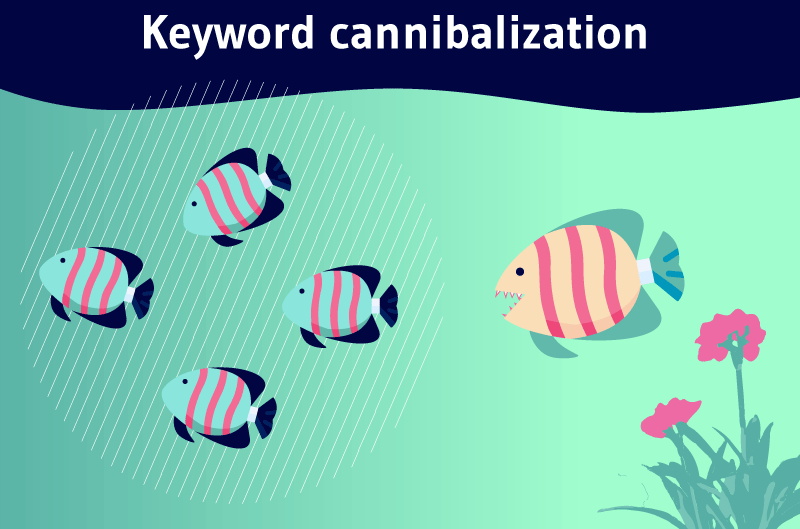The expression Keywords Cannibalization or Cannibalization of keywords is used to designate the competition which can exist between several pages or links of the same Internet site. This competition occurs when the said pages or articles are optimized for the same keyword or similar keywords.
There is no doubt that the use of keywords is essential to position the content of a website in search results

It is precisely their presence in a query that allows the user to have access to the various contents of the website. They are therefore necessary for referencing
Moreover, they obey a certain number of principles, rules and practices. When these practices are not respected, it can lead to a decrease in the performance of the website in search engines.
Other difficulties, such as keyword cannibalization can also occur. This is a problem that occurs when several pages of the same site are optimized around the same keyword.
In this article devoted mainly to this concept, I explain not only what it is, but also, how to detect it and get rid of it
Chapter 1: Cannibalization of keywords
In this first chapter, you will discover what is keyword cannibalization, the causes and consequences it can cause to your website
1.1) What is the cannibalization of keywords ?
As I have already reminded a little above, the Cannibalization of keywords is a problem that occurs when the articles or pages of a website are optimized on the same keyword or on similar keywords.
Simply put, when you have content that can be displayed or ranked for the same query in the search engine

This is because such optimization can cause competition between the contents and reduce their chance of ranking
This results according to searchengine by the decrease of the organic traffic, the conversion rate and the authority of the website
Therefore, some SEOs believe that when content is optimized on the same keyword, it creates confusion between Google and the content of the site.
The latter does not know exactly what to display and may even not rank any page for the keyword concerned
But this is not automatic, because in reality, it is not only because you have several contents optimized on the same keyword that they can not be ranked by search engines
The problem arises if beyond the optimization for the keyword, the pages of the site respond to the same search intention
This is exactly what SEMRUSH has proven through its experience with the keyword “MacBook pro”.
If you take a look at this experiment, you will see that Apple has two pages that rank in 1st and 2nd position for the word “MacBook pro”
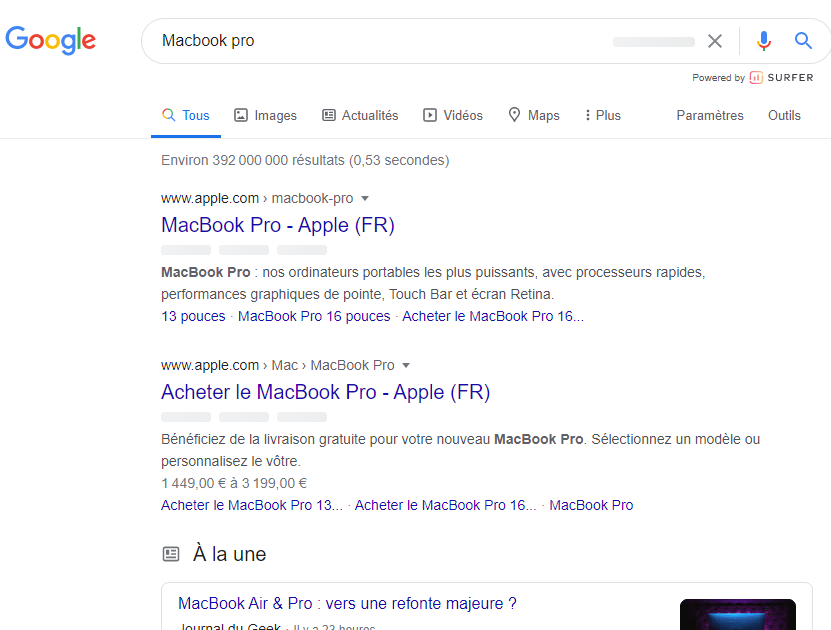
This disproves the idea that when two pages are optimized for the same keyword, they have trouble being ranked by the search engine
With this in mind, it is worth taking a closer look at the two pages to determine what accounts for their ranking in the search results
A closer analysis of the two pages then shows that
The first page is a page that offers an overview of the MacBook pro product and compares it with other models

The second page is a traditional page that is mainly reserved for those who want to make a purchase.
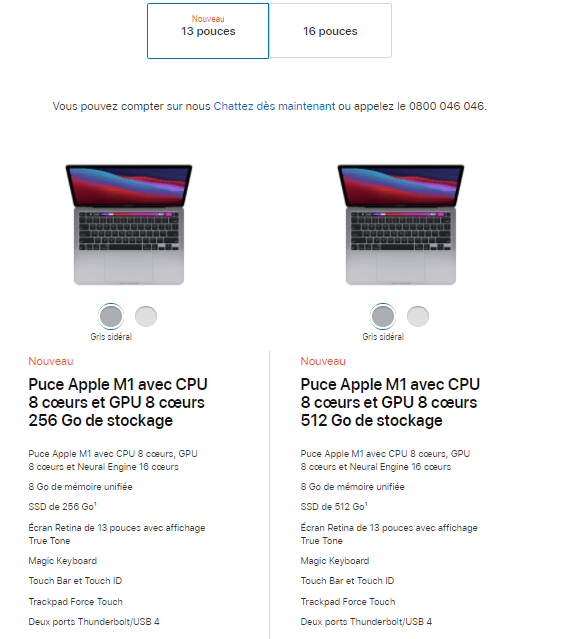
From this we understand that the two pages do not have the same purpose and therefore do not respond to the same research intention
In fact, the first page allows users to gather more information about the MacBook pro product, but also to compare it with other models
The second page has another objective, which is to facilitate the purchase of the product
It appears that the search intent of each of these pages is different, which is why they were displayed in the search engine.
Moreover, it is important not to confuse keyword cannibalization with duplicate content which consists in copying exactly the content of a web page on another.
In addition, the use of a keyword in a small number of publications should not cause problems of cannibalization. It is actually the optimization of several contents around the same keyword that causes this situation
That’s why it mainly affects sites or large blogs
1.2. The causes of keyword cannibalization
As you can imagine, keyword cannibalization is not a problem that occurs in isolation.
It is actually caused by a number of practices among which I can mention
1.2.1. Inconsistent use of anchor texts
When you use the same anchor text for several links or publications, this may make the search engine believe that all these links have the same value.

The consequence is that the search engine will have difficulties in choosing the page to display when an Internet user makes a request
1.2.2. A bad structuring of the internal links of your site
Another cause of the cannibalization of keywords is the poor structuring of internal links of your site
Indeed, when you have a site with several pages, the risks of conflict between them are higher. Because there is more chance that the site has similar pages
It is therefore interesting to set up a linking structure of the pages of the site. This is done in order to show the search engine robots the pages that are of great importance
1.2.3. The bad configuration of hreflang tags
The hreflang tags tags ensure that the language pages or country pages of your website are displayed correctly depending on where the query was made
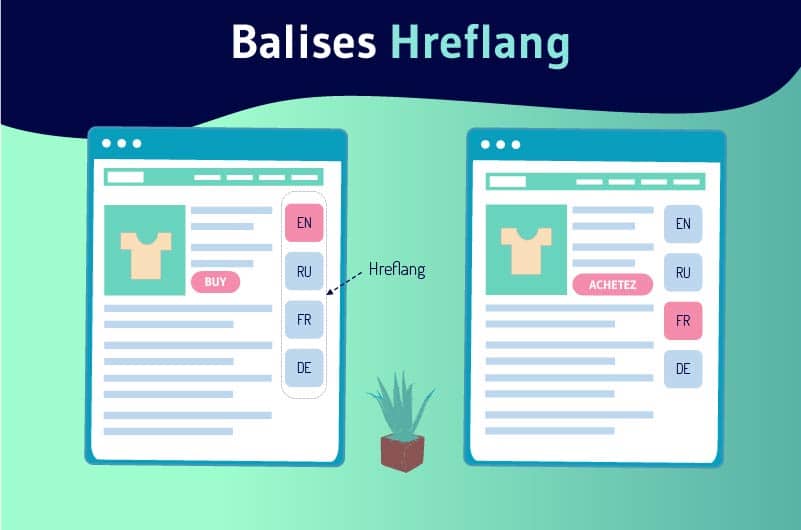
Any misconfiguration of this tag can lead to a wrong display
This means that the user, instead of finding pages corresponding to his country or search location, falls on the pages of another country
This is a form of cannibalization which, according to the site hreflangbuildersite, is caused by an incomplete implementation of the hreflang tag
Indeed, although the pages requested by Internet users exist, cannibalization causes the search engine to process the requests of Internet users according to its own will
1.2.4. The wrong configuration of your metadata
The problem of keyword cannibalization can also occur when the metadata of your different pages are optimized on the same or similar keywords
1.3. The consequences of keyword cannibalization
Among the difficulties that keyword cannibalization can create for your website, you can have :
- A lower ranking the cannibalization of keywords can lead to a better ranking of the less performing contents of your site at the expense of those that have a good quality. As a result, when typing a query that includes the cannibalized keyword, the audience may come across information that is not relevant at all
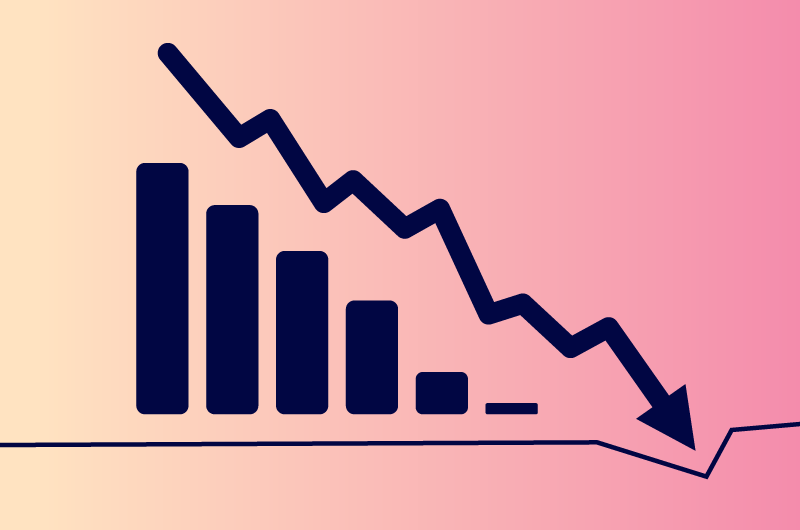
- Also, instead of an authoritative page, with such a ranking, the results generated are scattered. The authority of your page and the organic click-through rate is spread over all the pages or URLs that are optimized on the cannibalized keyword;
- The waste of your exploration budget the time and resources that Google devotes to the exploration of your website are governed by a crawl budget.

Indeed, for more efficiency and because of the multitude of information that are present on the web, Google allocates to each site a budget of exploration. This budget defines the number of pages that the robots are able to explore and index;
- The identification of your content as poor quality content when there are several pages that are optimized for the same keyword, the results that this word generates are shared between each of them. In addition, Google may consider that the content of each page is superficial or uninteresting to readers. It can also proceed to downgrade them in the search engine.
Now that you have an overview of what keyword cannibalization is, what causes it and the difficulties it can cause for a website, find out how to identify it
Chapter 2: How to detect keyword cannibalization problems on your website?
Here, you will find different ways to identify keyword cannibalization problems that might occur at your site
Actually, there are several ways for you to identify these problems. Nevertheless, they can be classified into two broad categories
- Manual identification;
- Identification using SEO tools
2.1. Manual identification of keyword cannibalization problems
For this identification, you can
2.1.1. Perform a search using the site operator:
The “site:” search operator allows you to specifically display the content of a site in Google search results.
It can therefore be the first means by which you identify the existence or not of a Cannibalization on your website
To do this, just use the formula “site:” before the keyword concerned as in the following example: “yoursite.com: keyword”.
For example, to identify the pages that are classified around the keyword search on Twaino, just do twaino.com: keyword search
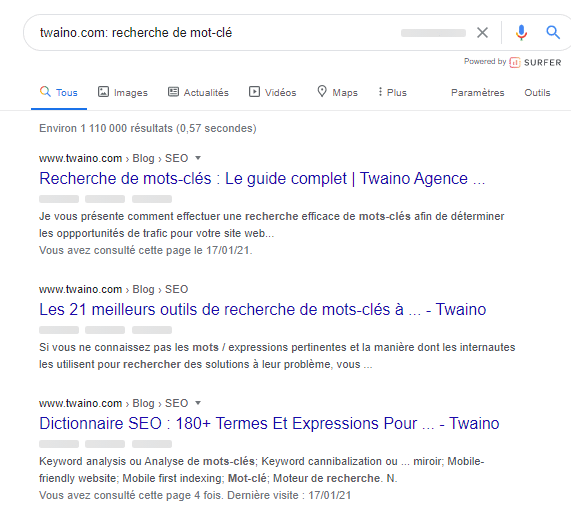
2.1.2. Filter all your keywords in a spreadsheet :
You can also track or identify the Cannibalization of your website’s keywords by simply creating an excel file.
It will then be a matter of listing all the keywords of the site by using and collecting information about them such as
- The number of articles or pages on which they appear;
- The traffic they generate, their rank;
- Etc
2.2. Identification from SEO tools
Several SEO tools will also allow you to easily identify all the problems of keyword cannibalization that you encounter on your site. These are tools like
2.2.1. The Google Search Console
In the tab reserved for performance reports in the tool Search consoletool, you will find the queries as well as the impressions and clicks that they generate on your site
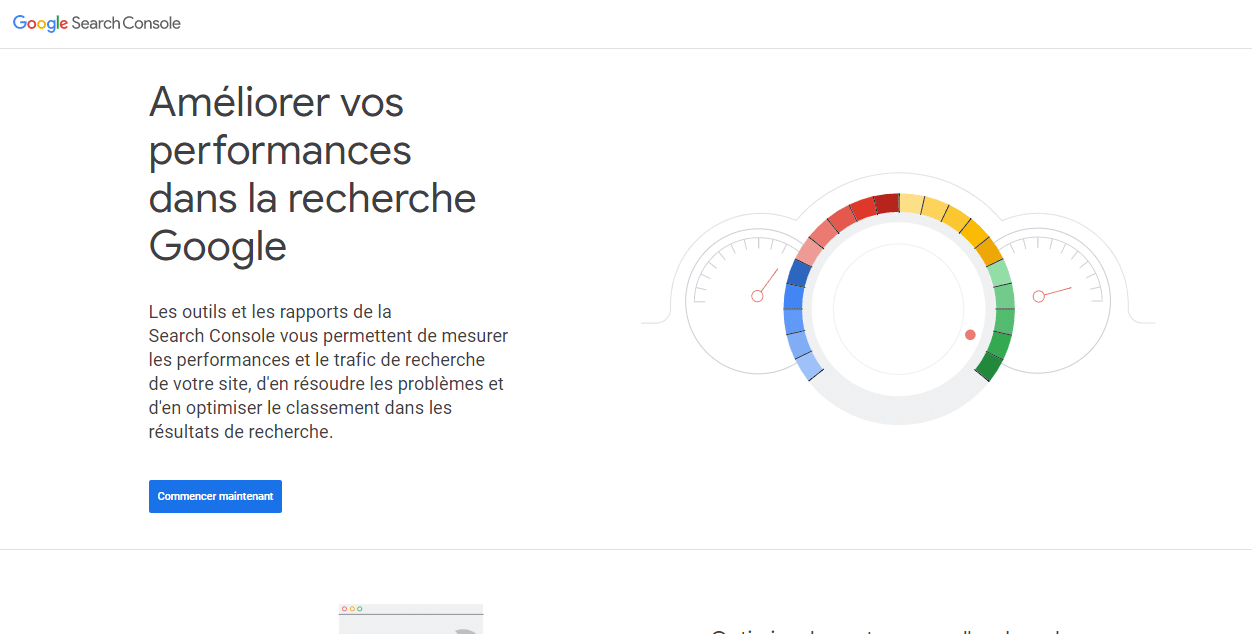
Browse these queries with the “pages” tab to access the list of URLs that match each query. If you see several URLs of your site listed for the same keyword: It is perhaps a cannibalization problem. Concretely, here is how to proceed
- Log into your search console account;
- Select the “Performance” tab;
- Click on “Queries” below the graphs;
- In the list of keywords that appear under the graph, click on the one you want to analyze;
- Finally, activate the “Pages” option to view the URLs that rank on the keyword.
2.2.2. Ahrefs
The tool Ahrefs tool allows you to detect the cannibalized keywords on your website
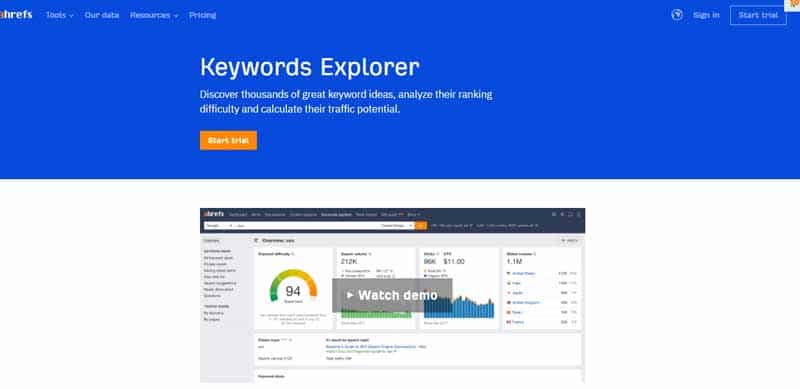
To do this, simply consult the report on the organic keywords of your site which is in the site explorer tab
2.2.3. SEMrush
At the level of SEMrush the procedure consists in doing the same thing as on Ahrefs, i.e. locating the list of keywords of your site and consulting the information that the tool provides about it.

In fact, once you have paid access, SEMrush’s keyword position tracking tool provides you with a Keyword Cannibalization report that displays the Cannibalization score
A score of 100% implies that there is no cannibalization while lower scores indicate potential risks.
2.2.4. Ryte search
Ryte search can provide you with a precise report of the keywords that suffer from a cannibalization problem on your site. This report can be found in the “optimize” navigation tab
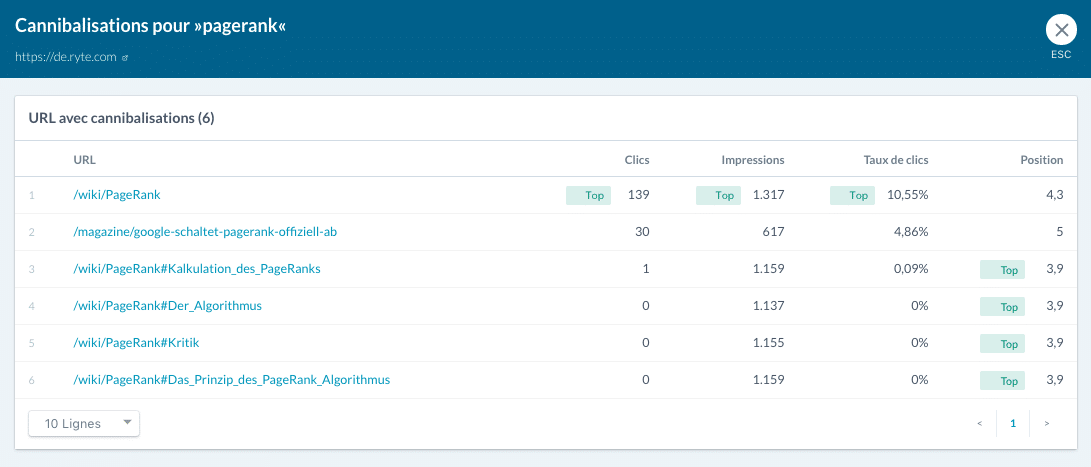
Source Ryte
It allows you
- To see the overview of the concerned pages;
- The details about this keyword.
2.2.5. SEOquantum
SEOquantum is an SEO tool specially designed to help you work on the semantic side of your keywords as well as improving your writing techniques

2.2.6. SEO clarity
SEO clarity is an all-in-one SEO tool that can help you find and solve the various problems your site is facing
SEO clarity not only allows you to identify all the keywords on your site, but also to see if they have multiple ranking links

To do this, simply:
- Go to the tab “smart tracking”;
- To choose Keywords ;
- And to configure the filter menu to see the keywords that meet your criteria
2.2.7 Keylogs
Keylogs is an SEO tool designed to help you drill down into the data collected about your site in the search console. Among its many features and tools, Keylogs also offers a tool to check for keyword cannibalization

As soon as you log into your Google account, you can get the results on all the pages of your site that are ranked for the same keyword
The tool is not free but there is a free version that allows you to track 3 keywords
2.2.8. SEO Scout
Specially designed to help you improve your organic traffic, the Seo Scout tool has a keyword cannibalization checker

Once logged in, you just need to enter the keyword you want to check to get the detailed report and keyword ranking
2.2.9. Moz Keyword Explorer
The keyword research tool of Moz s keyword research tool also allows you to identify the keywords, their ranking and the URLs they point to.

With such a tool, you will quickly know the errors that mar your pages and can easily take the necessary decisions to rework them
In addition, note that all of these tools facilitate the export of your data in CSV format. This allows you to download and analyze your data offline
Now that you know how to identify cannibalization problems, find out in the next section what solutions can be applied
Chapter 3: How to solve the keyword cannibalization problem ?
In this chapter, I will show you some solutions concerning the resolution of possible keyword cannibalization problems
Indeed, to solve the Cannibalization of keywords, here are the different solutions you can adopt
3.1. re-optimize the competing pages
As you already know, the cannibalization of keywords comes from the optimization of pages or articles on the same keyword
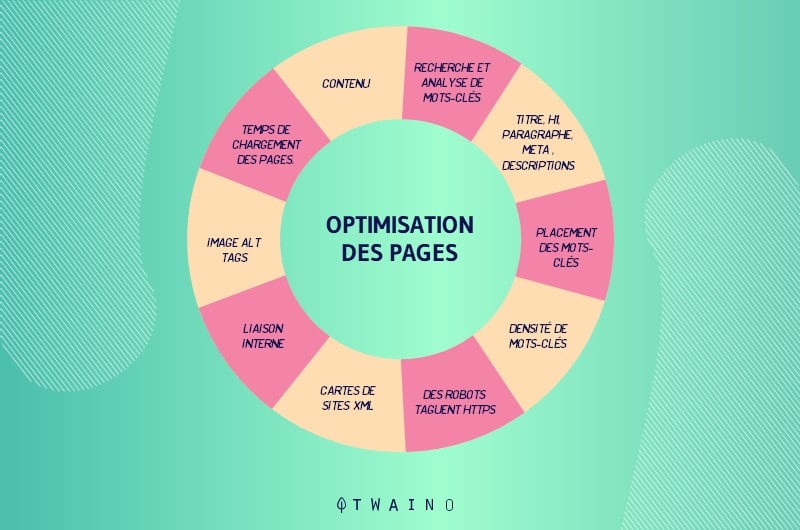
Therefore, a simple solution after identifying the elements that suffer from such a problem is the re-optimization of the pages
It will essentially be a matter of re-targeting by determining the main page or article that should be targeted on the keyword and then proceeding differently with the optimization of the pages that are in competition.
3.2. merge or combine the different articles or pages of your website
Starting from the idea that there could be two similar articles on your site that are optimized on the same keyword, the solution to consider at this level is to proceed to their merger. In other words, you combine them to make one good article. The advantage of this combination will undoubtedly be the increase in the quality of the article you will have
Likewise, the merger will increase the authority of your page as well as the retention rate of visitors. Nevertheless, before this combination, you must necessarily take into account a number of elements
Because, the merger or combination of two or more existing articles requires some prerequisites
For example, you will have to choose
- The URL of the new content
- The question you are going to answer
- The structure of the text
- The way in which the ideas will be addressed
- Etc.
3.3. Use 301 redirects
301 redirects or permanent redirects are used to change the destination of an existing URL permanently
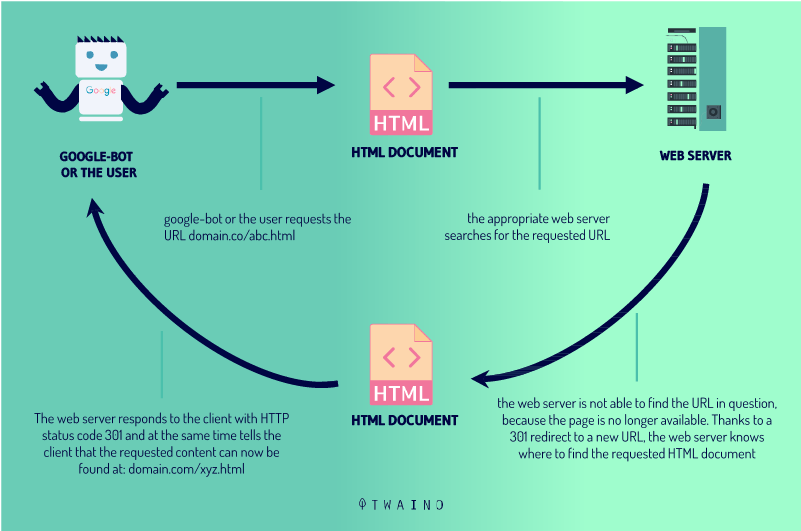
It is actually an HTTP status code used to tell the client browser that the URL it wants to access has been permanently moved to another URL
In terms of functionality, 301 redirects can be used to solve the problem of keyword cannibalization. To do this, you need to:
- Identify all pages (URLs) that are in competition;
- Choose the best page that matches the keyword;
- Redirect all other URLs to this page
3.4. Use canonical links
When you have similar or identical pages on your site, the search engine may consider them as duplicate content and issue penalties against them.
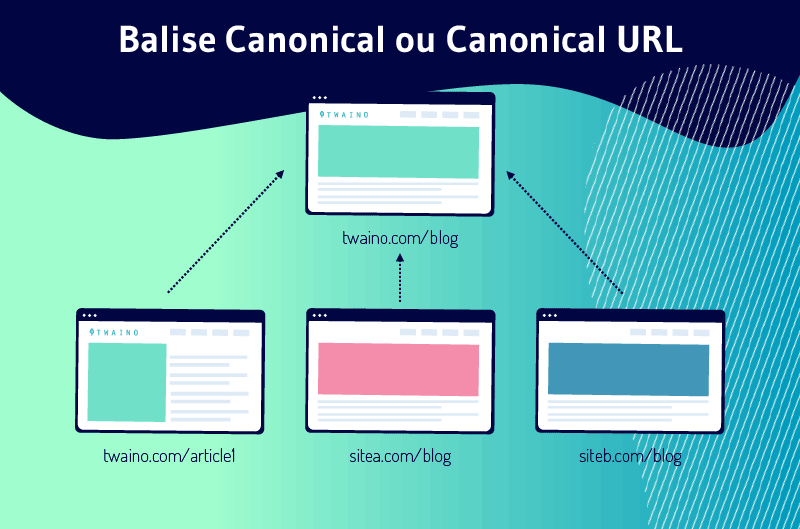
To avoid this, it is often necessary to use canonical URLs to inform search engines about the link they should display
Thus, each time a request is made, the search engine will display the canonical link
The implementation of a of a canonical tag can also be a solution to keyword cannibalization problems.
3.5. Use “noindex” and “nofollow” tags
Noindex is an attribute that means that a web page should neither be indexed by search engines nor displayed on search engine results pages.

Despite the previous approaches to solve the competition that could exist around keywords, the attribute: rel = noindex can be used on some pages
This will allow the search engine to remove them from their index and thus prevent their display
The tag “nofollow” means that Googlebots should not explore the links on a page.
This attribute can therefore be used on other pages of the site that contain links redirecting to competing pages
3.6. Improve the internal link structure of your site
The structure of internal links can also contribute to solving the problems of keyword cannibalization
Indeed, for a search engine like Google, links, whether internal or external, are very important
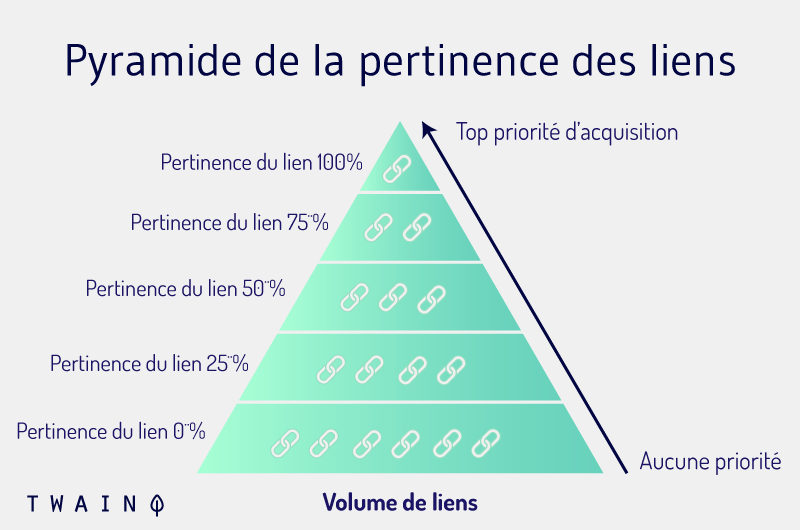
For example, by linking similar content to each other, especially to the one that seems to be the most important, the search engine itself proceeds to their hierarchy.
This is what it then displays in the search results
It is therefore necessary when this solution is considered to link the contents to the one that you want to prioritize the most
Despite all these solutions, another more extreme one can be used. This is the deletion of the content that poses a problem
However, it should be remembered that this can be done when it is considered that it is no longer relevant to the website.
3.7. Plan the content creation work in advance
To avoid the consequences that could arise from the cannibalization of keywords in the future, it would be interesting to plan in advance the contents that you plan to publish

This will involve not only identifying in advance the keywords to be used, but also keeping an eye on all the keywords you want to use.
3.8. Take into account the search intention of the Internet users
As you can imagine, the main objective of search engines is to provide Internet users with the results that best meet their request.
For this reason, it would be interesting to identify a specific problem and solve it in the writing.

These are different solutions that can be used to solve the cannibalization of keywords.
However, let’s keep in mind that it is always better to prevent this problem in order to avoid the various consequences
You could therefore consider
- To list all the keywords used on your site in an excel sheet;
- Or check if there are similar pages around the keyword from a search with the site operator
In summary
Although it may seem small, keyword cannibalization can become a big problem for your website.
It can even be the source of great difficulties such as
- The downgrading of your website’s pages
- The decrease of the organic click rate
- Or even the decrease of the global authority of the website
You must therefore carry out regular checks and be attentive in order to identify and eliminate it
In this article, you will find not only the causes and consequences of this problem, but also various ways to identify and eradicate it
See you soon!

